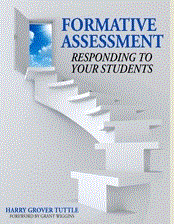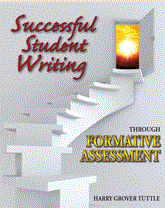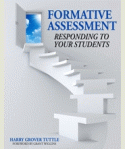I am painfully aware that helping students to be able to self-assess is a slow task. On the other hand, I realize how critical this skill is as a lifelong skill. Unless students can self-assess, they will not be able to improve on their own. I certainly do not want my students dependent on me for the rest of their lives to make sure that they are “correct”. I want them to be able to determine for themselves what they are doing and how well it helps them to get to their desired goal. They should be empowered to make their own decisions about the things they do. They do need our help in developing from very structured self-assessments (Right or Wrong for lower level answers) to evaluating their decisions without any given criteria. Students need to transition through this process.
Formative assessment provides a wonderful stepping stone to self-assessment. As students learn to assess others, they learn what is important about the learning, how that learning can be demonstrated, and how to identify and implement formative feedback. They develop the skill to objectively look at their own work. They understand that they have the techniques to improve. As one of my English students said, ” I’m learning to look at my own paper as I do when I peer review another student’s paper.”
How do you help your students to be able to self-assess? Do you use formative assessment as a stepping stone?
My book, Formative Assessment: Responding to Your Students, is available through Eye on Education.
Also, my book, Successful Student Writing Through Formative Assessment, is available through Eye on Education.











 Formative Assessment and Successful Student Writing Through Formative Assessment by Harry Grover Tuttle
Formative Assessment and Successful Student Writing Through Formative Assessment by Harry Grover Tuttle
